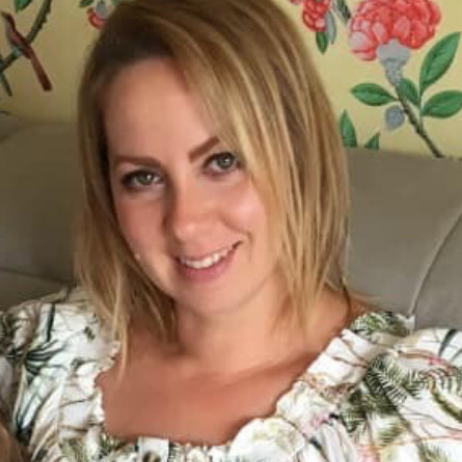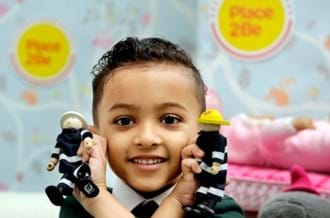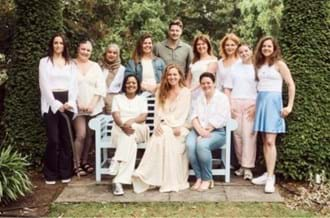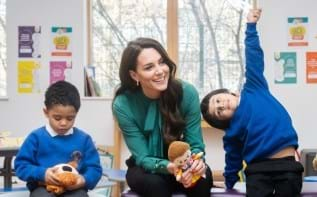5 ways to get children moving for their mental health
5 ways to get children moving for their mental health

Rebecca Wilkinson-Quinn
Clinical Lead for Scotland - Rebecca joined Place2Be in 2007, and is responsible for our work in secondary schools across the UK. Rebecca is a HCPC registered Art Psychotherapist and clinical supervisor with over 20 years’ experience working with children and young people in school settings.
Place2Be’s Clinical Lead for Scotland, Becky Wilkinson-Quinn, discusses the importance of physical activity and shares some tips for parents, caregivers and teachers on how to get children and young people moving for their mental health.
This year’s Mental Health Awareness Week theme is ‘Moving more for our mental health’ – recognising the crucial role being active plays in looking after our mental wellbeing. To mark the week, and our partnership with The Daily Mile, we’ve shared some tips to help get children moving for their mental health.
Download our printable tipsheet
Movement and mental health
Regular movement can boost self-esteem, improve quality of sleep, contribute to better social skills and reduce feelings of anxiety. During feelings of anxiety, our bodies can experience the 'fight, flight, freeze' response. Our hearts beat faster, we sweat more, and our muscles tense.
Physical activity can help release these feelings. Our brains also release chemicals when we exercise – called endorphins - that make us feel good. Even just 10 minutes of fast walking can contribute to mental alertness, increased energy and positive mood.
The NHS recommends that children are active for 60 minutes daily, with 30 minutes of that activity needing to occur outside of school.
Tips for getting children moving
We've suggested some things to help get children moving for their mental health. Read our tips below or download our printable tipsheet (also available in Welsh).
Everyday movement counts
Engage children and young people in physical activities that are accessible in daily life. Embrace initiatives like The Daily Mile, a simple yet transformative initiative for children’s health. It involves classes heading outside to run, wheel or walk around the school grounds for 15-minutes every day, at whatever pace suits the child.
- Think about how children can incorporate movement into regular daily routines.
- Encourage children to walk, bike or scooter to school instead of taking the car or bus.
- What about turning the music up and dancing during study breaks or a sequence of yoga stretches before bed?
- Tip for Daily Mile schools: Consider tracking the number of Daily Mile's each day to contribute to a journey across the globe. (Provided by Cardonald Primary School, Scotland)
Make it fun
Children and young people are going to be more eager to take part in physical activity if they are doing something they enjoy. Making it fun will not only support their mental wellbeing but help them have a positive attitude towards physical activity as they get older.
- Reflect on their interests and strengths, ask them how movement could be woven into what they love doing.
- Put emphasis on enjoyment and skill development rather than focusing on competition to help them have a positive experience of physical activity.
- Tip for Daily Mile schools: Introduce a ‘Music Mile’ from time to time, using a mobile speaker to enable the children to do their Daily Mile to some of their favourite songs. (Provided by Our Lady of Lourdes Primary School, Scotland)
Get into nature
Heading outdoors to exercise is a great way for children and young people to take a break from technology and connect with their environment.
- Encourage a walk or play outside to explore in the green spaces nearby – whether that be an inner-city park, a forest or along your local river or canal.
- Follow the child’s lead in how they want to play outside – encourage creativity and join in with activities if possible.
- Tip for Daily Mile schools: Ask children to reflect on the sights and sounds that they experience as they complete their Daily Mile outside. (Provided by Clifton Primary School, England)
For bigger day trips, we also love Forestry England’s handy map to find wellbeing trails in your local area. Themed panels along each trail invite you to pause, notice and reflect on your surroundings while getting active. Visit these pages for walking trail recommendations in Scotland, Wales and Northern Ireland.
Be the role model
While it’s not always easy, young people are more likely to take up physical activity if they see adults around them involved in and enjoying exercise. Focus on talking about how movement positively impacts your own life and avoid creating rules around it, as this could have a negative impact on how children and young people perceive exercise.
- Do your best to join in and be active together with the children and young people in your care.
- Discuss the benefits of being active and the impact it can have on physical and mental health.
- Tip for Daily Mile schools: Encourage all teachers and support staff to actively join in the Daily Mile (whether walking or running) to enhance the relationship between children and teachers. (Provided by Wells Hall Primary School, England)
Moving together
Not only does taking part in physical activity that is social help boost children and young people’s self-esteem, it’s also a great way to create a sense of community which can foster good mental wellbeing. When talking to children about sport, put emphasis on enjoyment and skill development rather than focusing solely on competition.
- Encourage children and young people to be active together.
- Encourage them to try different sports both at school and through clubs with their friends, until they find one that they really love.
- Tip for Daily Mile schools: Buddy-up children from different year groups to encourage side by side conversations as they move; forming new friendships and supporting each other. (Provided by Dalneigh Primary School, Scotland)
Download our 'Moving for mental health' tipsheet
Download 'Symud er lles iechyd meddwl' tipsheet (Welsh)
Other resources you may find useful
News & blogs

The power of play: from football drills to counselling skills
A reflection by Brendan Kiernan, professional footballer, qualified psychotherapist, and Place2Be Counsellor alumnus.
Read more
Launch of good practice guide for schools - supporting displaced families
Place2Be is proud to have collaborated with Save the Children UK in the creation of a good practice guide.
Read more
Carrie Elizabeth Jewellery launches new collection supporting Place2Be
Carrie Elizabeth Jewellery launches ‘Your Safe Space’, a collection designed to support connection and inner calm.
Read more



